中国-东盟全面经济合作框架协议
- 格式:docx
- 大小:14.83 KB
- 文档页数:1
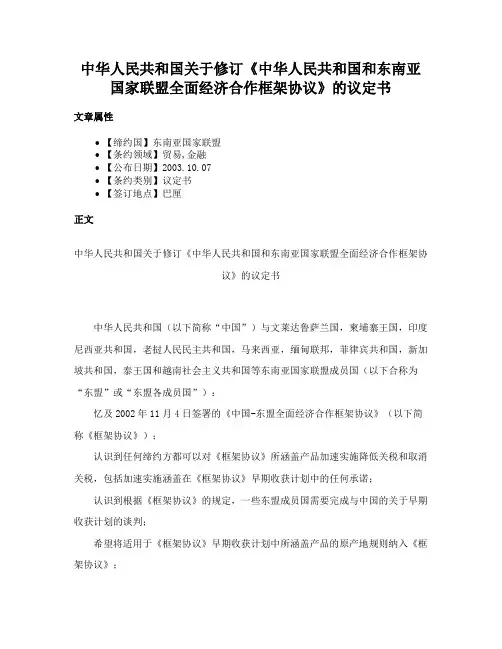
中华人民共和国关于修订《中华人民共和国和东南亚国家联盟全面经济合作框架协议》的议定书文章属性•【缔约国】东南亚国家联盟•【条约领域】贸易,金融•【公布日期】2003.10.07•【条约类别】议定书•【签订地点】巴厘正文中华人民共和国关于修订《中华人民共和国和东南亚国家联盟全面经济合作框架协议》的议定书中华人民共和国(以下简称“中国”)与文莱达鲁萨兰国,柬埔寨王国,印度尼西亚共和国,老挝人民民主共和国,马来西亚,缅甸联邦,菲律宾共和国,新加坡共和国,泰王国和越南社会主义共和国等东南亚国家联盟成员国(以下合称为“东盟”或“东盟各成员国”):忆及2002年11月4日签署的《中国-东盟全面经济合作框架协议》(以下简称《框架协议》);认识到任何缔约方都可以对《框架协议》所涵盖产品加速实施降低关税和取消关税,包括加速实施涵盖在《框架协议》早期收获计划中的任何承诺;认识到根据《框架协议》的规定,一些东盟成员国需要完成与中国的关于早期收获计划的谈判;希望将适用于《框架协议》早期收获计划中所涵盖产品的原产地规则纳入《框架协议》;希望修改《框架协议》现有的附件1和附件2的内容,以纳入中国与一些东盟成员国之间达成的早期收获协议,并增补相关的HS税号和产品描述;期望对《框架协议》中早期收获计划的各项条款的实施予以澄清说明;期望通过双边或诸边协议或安排来对加速实施《框架协议》早期收获计划中所涵盖产品降低和/或取消关税的方式和条件做出规定,并规定将此类协议或安排有效地附于《框架协议》:注意到《框架协议》第14条规定,任何以后的修订都需要各缔约方以书面形式相互同意。
现达成协议如下:第一条对《框架协议》第6条第3款(a)(iV)的修订删除《框架协议》第6条第3款(a)(iv),由如下新的第6条第3款(a)(iv)取代:对于未能完成附件1和附件2中的适当的产品清单的缔约方,产品清单仍可在相互同意的基础上并根据本协议附件3规定的实施时间框架制订完成。
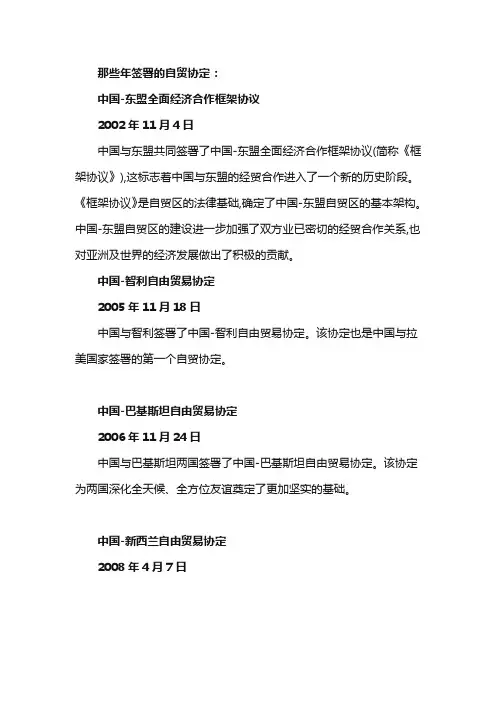
那些年签署的自贸协定:中国-东盟全面经济合作框架协议2002年11月4日中国与东盟共同签署了中国-东盟全面经济合作框架协议(简称《框架协议》),这标志着中国与东盟的经贸合作进入了一个新的历史阶段。
《框架协议》是自贸区的法律基础,确定了中国-东盟自贸区的基本架构。
中国-东盟自贸区的建设进一步加强了双方业已密切的经贸合作关系,也对亚洲及世界的经济发展做出了积极的贡献。
中国-智利自由贸易协定2005年11月18日中国与智利签署了中国-智利自由贸易协定。
该协定也是中国与拉美国家签署的第一个自贸协定。
中国-巴基斯坦自由贸易协定2006年11月24日中国与巴基斯坦两国签署了中国-巴基斯坦自由贸易协定。
该协定为两国深化全天候、全方位友谊奠定了更加坚实的基础。
中国-新西兰自由贸易协定2008年4月7日其他国家签署的第一个涵盖货物贸易、服务贸易、投资等诸多领域的全面自由贸易协定,也是我国与发达国家达成的第一个自由贸易协定。
中国-新加坡自由贸易协定2008年10月23日中国与新加坡签署了中国-新加坡自由贸易协定。
该协定进一步全面推进中新双边经贸关系的发展,也对东亚经济一体化进程产生积极影响。
中国-秘鲁自由贸易协定2009年4月28日中国与秘鲁签署了中国-秘鲁自由贸易协定。
该协定是我国与拉美国家签署的第一个一揽子自贸协定。
中国-哥斯达黎加自由贸易协定2010年4月8日中国与哥斯达黎加签署了中国-哥斯达黎加自由贸易协定。
该协定是中国与中美洲国家签署的第一个自贸协定。
中国-冰岛自由贸易协定2013年4月15日国家达成的首个自贸协定。
中国-瑞士自由贸易协定2013年7月6日中国与瑞士签署了中国-瑞士自由贸易协定。
该协定是中国与欧洲大陆国家签署的首个自贸协定。
中国-韩国自由贸易协定2015年6月1日中国与韩国签署了中国-韩国自由贸易协定。
该协定的签署标志着亚太地区自贸区建设迈出了重要一步,对两国携手推动“一带一路”建设和欧亚大陆经济融合将产生深远的积极影响。
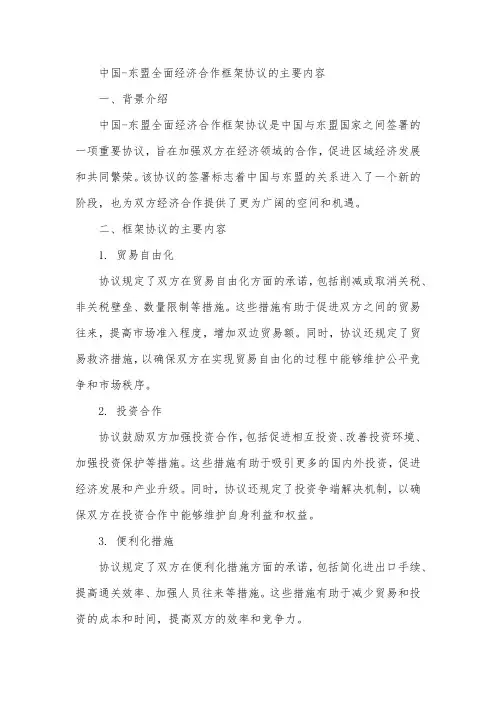
中国-东盟全面经济合作框架协议的主要内容一、背景介绍中国-东盟全面经济合作框架协议是中国与东盟国家之间签署的一项重要协议,旨在加强双方在经济领域的合作,促进区域经济发展和共同繁荣。
该协议的签署标志着中国与东盟的关系进入了一个新的阶段,也为双方经济合作提供了更为广阔的空间和机遇。
二、框架协议的主要内容1. 贸易自由化协议规定了双方在贸易自由化方面的承诺,包括削减或取消关税、非关税壁垒、数量限制等措施。
这些措施有助于促进双方之间的贸易往来,提高市场准入程度,增加双边贸易额。
同时,协议还规定了贸易救济措施,以确保双方在实现贸易自由化的过程中能够维护公平竞争和市场秩序。
2. 投资合作协议鼓励双方加强投资合作,包括促进相互投资、改善投资环境、加强投资保护等措施。
这些措施有助于吸引更多的国内外投资,促进经济发展和产业升级。
同时,协议还规定了投资争端解决机制,以确保双方在投资合作中能够维护自身利益和权益。
3. 便利化措施协议规定了双方在便利化措施方面的承诺,包括简化进出口手续、提高通关效率、加强人员往来等措施。
这些措施有助于减少贸易和投资的成本和时间,提高双方的效率和竞争力。
4. 能源合作协议强调了双方在能源领域的合作,包括加强能源资源开发和利用、推进清洁能源技术合作等措施。
这些措施有助于保障双方的能源安全和可持续发展,促进双方在能源领域的互利合作。
5. 农业合作协议规定了双方在农业领域的合作,包括加强农业技术交流与合作、推进农业产业化和现代化等措施。
这些措施有助于提高双方的农业生产和质量,促进农业发展和农民增收。
同时,协议还规定了农产品贸易相关措施,以确保双方在农业领域的合作能够维护公平竞争和市场秩序。
6. 其他领域合作协议还涉及了其他领域的合作,包括科技、文化、教育、旅游等领域。
这些领域的合作有助于增进双方之间的交流和了解,促进人文交流和民心相通。
同时,这些领域的合作也有助于推动双方的经济发展和产业升级。
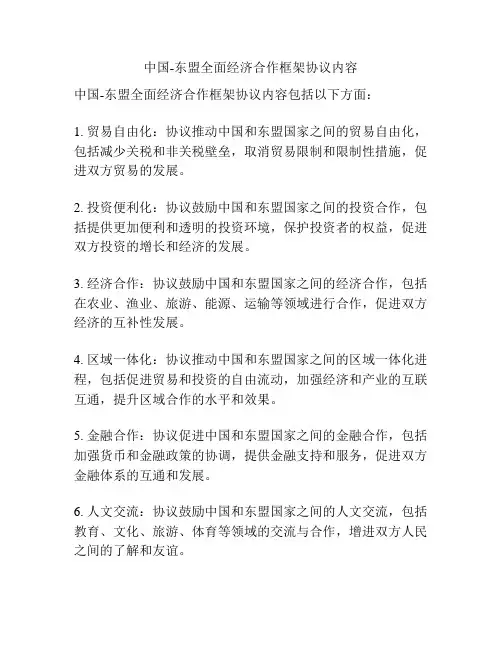
中国-东盟全面经济合作框架协议内容
中国-东盟全面经济合作框架协议内容包括以下方面:
1. 贸易自由化:协议推动中国和东盟国家之间的贸易自由化,包括减少关税和非关税壁垒,取消贸易限制和限制性措施,促进双方贸易的发展。
2. 投资便利化:协议鼓励中国和东盟国家之间的投资合作,包括提供更加便利和透明的投资环境,保护投资者的权益,促进双方投资的增长和经济的发展。
3. 经济合作:协议鼓励中国和东盟国家之间的经济合作,包括在农业、渔业、旅游、能源、运输等领域进行合作,促进双方经济的互补性发展。
4. 区域一体化:协议推动中国和东盟国家之间的区域一体化进程,包括促进贸易和投资的自由流动,加强经济和产业的互联互通,提升区域合作的水平和效果。
5. 金融合作:协议促进中国和东盟国家之间的金融合作,包括加强货币和金融政策的协调,提供金融支持和服务,促进双方金融体系的互通和发展。
6. 人文交流:协议鼓励中国和东盟国家之间的人文交流,包括教育、文化、旅游、体育等领域的交流与合作,增进双方人民之间的了解和友谊。
中国-东盟全面经济合作框架协议是中国与东盟国家之间加强经济合作、推动区域一体化的重要协议,对促进双方贸易和投资的发展,推动区域经济的繁荣具有重要意义。
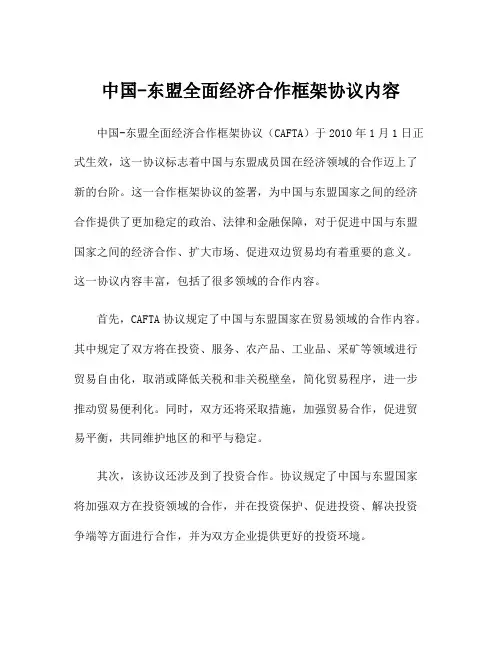
中国-东盟全面经济合作框架协议内容中国-东盟全面经济合作框架协议(CAFTA)于2010年1月1日正式生效,这一协议标志着中国与东盟成员国在经济领域的合作迈上了新的台阶。
这一合作框架协议的签署,为中国与东盟国家之间的经济合作提供了更加稳定的政治、法律和金融保障,对于促进中国与东盟国家之间的经济合作、扩大市场、促进双边贸易均有着重要的意义。
这一协议内容丰富,包括了很多领域的合作内容。
首先,CAFTA协议规定了中国与东盟国家在贸易领域的合作内容。
其中规定了双方将在投资、服务、农产品、工业品、采矿等领域进行贸易自由化,取消或降低关税和非关税壁垒,简化贸易程序,进一步推动贸易便利化。
同时,双方还将采取措施,加强贸易合作,促进贸易平衡,共同维护地区的和平与稳定。
其次,该协议还涉及到了投资合作。
协议规定了中国与东盟国家将加强双方在投资领域的合作,并在投资保护、促进投资、解决投资争端等方面进行合作,并为双方企业提供更好的投资环境。
另外,CAFTA协议还包括了财政、金融、农业等多个领域的合作内容。
双方将在这些领域进行合作,促进双方财政、金融、农业等领域的互利合作,实现合作共赢。
此外,CAFTA协议还规定了中国与东盟国家在知识产权保护、科技合作、信息通信等领域的合作内容。
双方将在这些领域进行合作,促进双方在知识产权保护、科技合作、信息通信等领域的合作,实现共同发展。
总体来看,中国-东盟全面经济合作框架协议(CAFTA)的内容非常丰富,包括贸易、投资、财政金融、农业、知识产权保护、科技合作等多个领域的合作内容。
这一协议的签署对中国与东盟国家之间的经济合作具有重要的意义,为促进双方的合作,加强双方的良好关系奠定了坚实的基础。
相信在双方共同努力下,中国与东盟国家之间的经济合作将会不断取得新的成果。
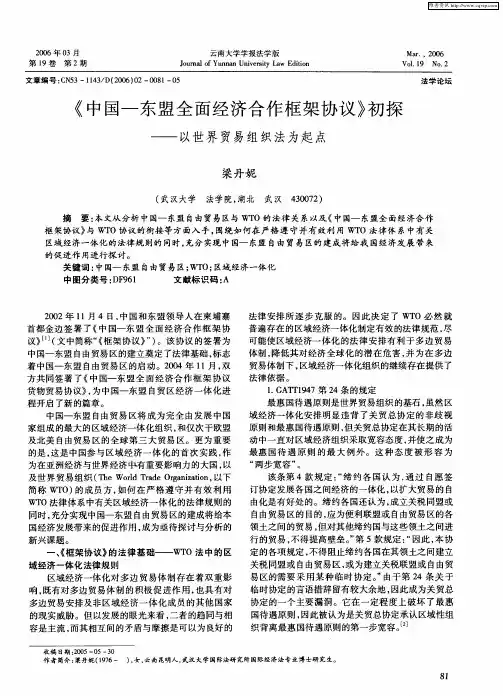
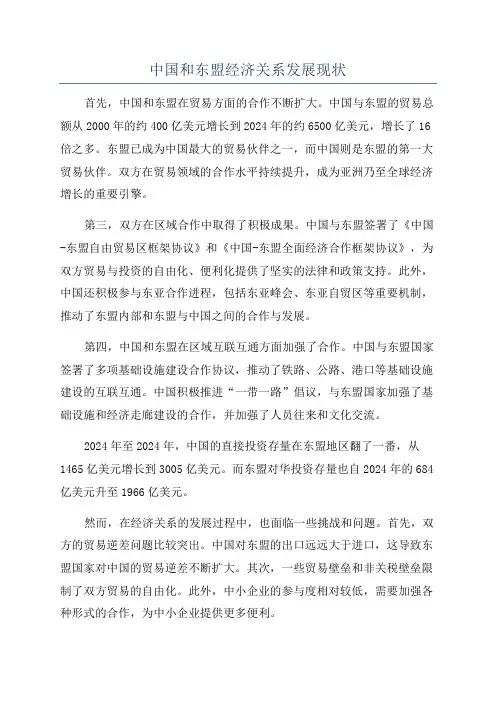
中国和东盟经济关系发展现状首先,中国和东盟在贸易方面的合作不断扩大。
中国与东盟的贸易总额从2000年的约400亿美元增长到2024年的约6500亿美元,增长了16倍之多。
东盟已成为中国最大的贸易伙伴之一,而中国则是东盟的第一大贸易伙伴。
双方在贸易领域的合作水平持续提升,成为亚洲乃至全球经济增长的重要引擎。
第三,双方在区域合作中取得了积极成果。
中国与东盟签署了《中国-东盟自由贸易区框架协议》和《中国-东盟全面经济合作框架协议》,为双方贸易与投资的自由化、便利化提供了坚实的法律和政策支持。
此外,中国还积极参与东亚合作进程,包括东亚峰会、东亚自贸区等重要机制,推动了东盟内部和东盟与中国之间的合作与发展。
第四,中国和东盟在区域互联互通方面加强了合作。
中国与东盟国家签署了多项基础设施建设合作协议,推动了铁路、公路、港口等基础设施建设的互联互通。
中国积极推进“一带一路”倡议,与东盟国家加强了基础设施和经济走廊建设的合作,并加强了人员往来和文化交流。
2024年至2024年,中国的直接投资存量在东盟地区翻了一番,从1465亿美元增长到3005亿美元。
而东盟对华投资存量也自2024年的684亿美元升至1966亿美元。
然而,在经济关系的发展过程中,也面临一些挑战和问题。
首先,双方的贸易逆差问题比较突出。
中国对东盟的出口远远大于进口,这导致东盟国家对中国的贸易逆差不断扩大。
其次,一些贸易壁垒和非关税壁垒限制了双方贸易的自由化。
此外,中小企业的参与度相对较低,需要加强各种形式的合作,为中小企业提供更多便利。
总体而言,中国和东盟的经济关系发展迅速,合作领域不断扩大,带动了双方经济的增长与繁荣。
然而,双方在贸易平衡、区域合作和贸易壁垒等领域仍面临一些挑战和问题,需要进一步加强合作,推动经济关系的持续稳定发展。
随着“一带一路”倡议的推进和区域合作的加强,相信中国和东盟之间的经济合作将进一步深化,为双方带来更多机遇和共同发展。
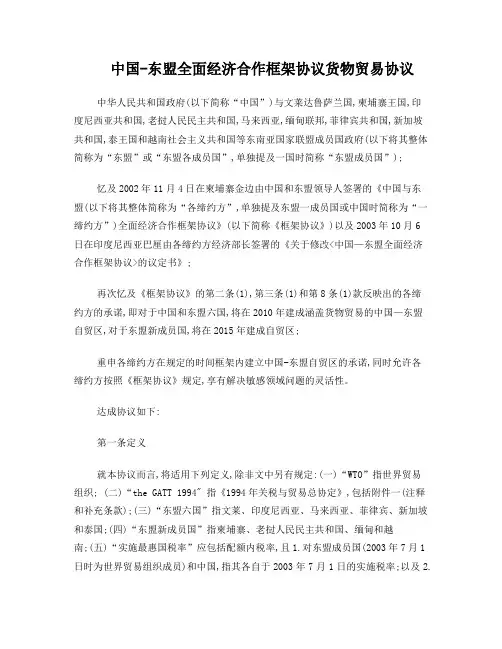
中国-东盟全面经济合作框架协议货物贸易协议中华人民共和国政府(以下简称“中国”)与文莱达鲁萨兰国,柬埔寨王国,印度尼西亚共和国,老挝人民民主共和国,马来西亚,缅甸联邦,菲律宾共和国,新加坡共和国,泰王国和越南社会主义共和国等东南亚国家联盟成员国政府(以下将其整体简称为“东盟”或“东盟各成员国”,单独提及一国时简称“东盟成员国”);忆及2002年11月4日在柬埔寨金边由中国和东盟领导人签署的《中国与东盟(以下将其整体简称为“各缔约方”,单独提及东盟一成员国或中国时简称为“一缔约方”)全面经济合作框架协议》(以下简称《框架协议》)以及2003年10月6日在印度尼西亚巴厘由各缔约方经济部长签署的《关于修改<中国—东盟全面经济合作框架协议>的议定书》;再次忆及《框架协议》的第二条(1),第三条(1)和第8条(1)款反映出的各缔约方的承诺,即对于中国和东盟六国,将在2010年建成涵盖货物贸易的中国—东盟自贸区,对于东盟新成员国,将在2015年建成自贸区;重申各缔约方在规定的时间框架内建立中国-东盟自贸区的承诺,同时允许各缔约方按照《框架协议》规定,享有解决敏感领域问题的灵活性。
达成协议如下:第一条定义就本协议而言,将适用下列定义,除非文中另有规定:(一)“WTO”指世界贸易组织; (二)“the GATT 1994" 指《1994年关税与贸易总协定》,包括附件一(注释和补充条款);(三)“东盟六国”指文莱、印度尼西亚、马来西亚、菲律宾、新加坡和泰国;(四)“东盟新成员国”指柬埔寨、老挝人民民主共和国、缅甸和越南;(五)“实施最惠国税率”应包括配额内税率,且1.对东盟成员国(2003年7月1日时为世界贸易组织成员)和中国,指其各自于2003年7月1日的实施税率;以及2.对东盟成员国(2003年7月1日时为非世界贸易组织成员),指其在2003年7月1日对中国产品实施的税率;(六)“非关税措施”应包括非关税壁垒;(七)“AEM”指东盟经济部长;(八)“MOFCOM”指中华人民共和国商务部;(九)“SEOM”指东盟经济高官会。
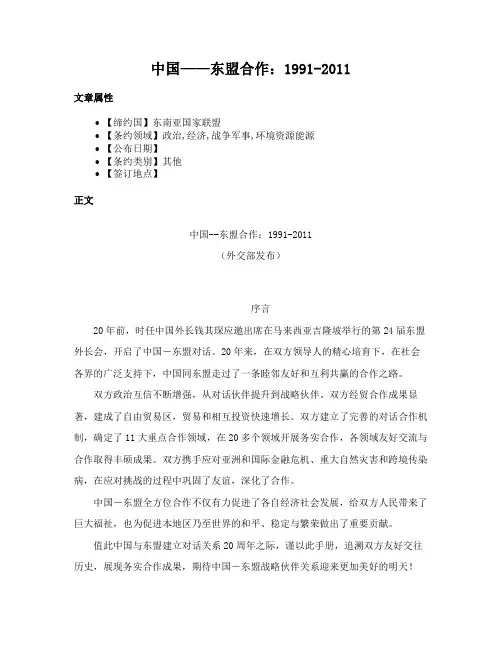
中国——东盟合作:1991-2011文章属性•【缔约国】东南亚国家联盟•【条约领域】政治,经济,战争军事,环境资源能源•【公布日期】•【条约类别】其他•【签订地点】正文中国--东盟合作:1991-2011(外交部发布)序言20年前,时任中国外长钱其琛应邀出席在马来西亚吉隆坡举行的第24届东盟外长会,开启了中国-东盟对话。
20年来,在双方领导人的精心培育下,在社会各界的广泛支持下,中国同东盟走过了一条睦邻友好和互利共赢的合作之路。
双方政治互信不断增强,从对话伙伴提升到战略伙伴。
双方经贸合作成果显著,建成了自由贸易区,贸易和相互投资快速增长。
双方建立了完善的对话合作机制,确定了11大重点合作领域,在20多个领域开展务实合作,各领域友好交流与合作取得丰硕成果。
双方携手应对亚洲和国际金融危机、重大自然灾害和跨境传染病,在应对挑战的过程中巩固了友谊,深化了合作。
中国-东盟全方位合作不仅有力促进了各自经济社会发展,给双方人民带来了巨大福祉,也为促进本地区乃至世界的和平、稳定与繁荣做出了重要贡献。
值此中国与东盟建立对话关系20周年之际,谨以此手册,追溯双方友好交往历史,展现务实合作成果,期待中国-东盟战略伙伴关系迎来更加美好的明天!一、政治、安全与地区事务政治1991年7月,时任中国国务委员兼外长钱其琛出席在马来西亚吉隆坡举办的第24届东盟外长会,标志着双方对话进程的开始。
1996年,中国成为东盟全面对话伙伴。
1997年,双方合作应对亚洲金融危机,中国坚持人民币不贬值,赢得东盟国家广泛赞誉。
同年12月,首次中国-东盟领导人非正式会议在马来西亚举行。
会议确定双方建立面向21世纪的睦邻互信伙伴关系。
2003年10月,第七次中国-东盟领导人会议确定双方建立战略伙伴关系。
同年,中国政府宣布加入《东南亚友好合作条约》。
中国高度重视并致力于发展深化同东盟的睦邻友好合作关系。
在东盟对话伙伴中,中国第一个加入《东南亚友好合作条约》,第一个与东盟建立战略伙伴关系,第一个明确支持《东南亚无核武器区条约》,第一个确定同东盟建立自贸区。
![中国东盟知识题目[整理]](https://uimg.taocdn.com/b3b8eac577a20029bd64783e0912a21614797f00.webp)
1.1996年7月,第______届东盟常设委员会第六次会议将中国由过去的东盟磋商伙伴国升格为东盟全面对话伙伴国。
A.27B.28C.29D.302.2000年11月,我国时任总理______提出建立中国—东盟自贸区的设想,得到了东盟各国领导人的积极响应。
A. 朱镕基B.李鹏C.温家宝D.李瑞环3.2002 年 11 月 4 日,我国与东盟签署了《中国-东盟全面经济合作框架协议》,决定在______年建成中国—东盟自贸区,并正式启动了自贸区建设的进程。
A.2005B.2007C.2009D. 20104.中国—东盟自贸区是中国对外建立的____自贸区,其成员包括中国和东盟10国,涵盖____人口和____平方公里。
A. 第一个, 18亿, 1400万B.第二个,20亿,1500万C.第一个,20亿,1400万D.第二个,18亿,1400万5.目前,东盟是我国在发展中国家中最大的贸易伙伴,我国是东盟的____贸易伙伴。
A.第一大B.第二大C.第三大D.第四大6.自由贸易区,简称自贸区,是指两个或多个经济体,在____承诺的基础上,相互逐步取消绝大多数产品的关税和非关税措施,开放服务业和投资市场,实现贸易、投资的全面自由化。
A.ADSEC. WTOD.ASEAN7.东盟的由来“东盟”是“东南亚国家联盟”的简称, 1967年8月7-8日,印尼、泰国、新加坡、菲律宾四国外长和马来西亚副总理在曼谷举行会议,发表了____,正式宣告东南亚国家联盟成立。
A. 《曼谷宣言》B. 《东南亚国家联盟宣言》C.《东南亚贸易协议》D.《东南亚国家联盟全面经济合作框架协议》8.东盟成员国到2002年止,东盟共有10个成员国,观察员国为______A.俄罗斯B.巴基斯坦C.韩国D.巴布亚新几内亚。
9.中国与东盟就建立自由贸易区签订了五大法律文件,按时间顺序排列为_____________________________________________________________。
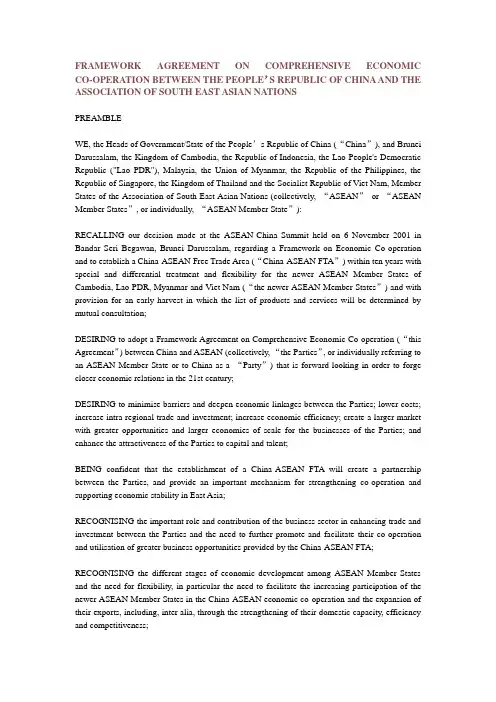
FRAMEWORK AGREEMENT ON COMPREHENSIVE ECONOMIC CO-OPERATION BETWEEN THE PEOPLE’S REPUBLIC OF CHINA AND THE ASSOCIATION OF SOUTH EAST ASIAN NATIONSPREAMBLEWE, the Heads of Government/State of the People’s Republic of China (“China”), and Brunei Darussalam, the Kingdom of Cambodia, the Republic of Indonesia, the Lao People's Democratic Republic ("Lao PDR"), Malaysia, the Union of Myanmar, the Republic of the Philippines, the Republic of Singapore, the Kingdom of Thailand and the Socialist Republic of V iet Nam, Member States of the Association of South East Asian Nations (collectively, “ASEAN”or “ASEAN Member States”, or individually, “ASEAN Member State”):RECALLING our decision made at the ASEAN-China Summit held on 6 November 2001 in Bandar Seri Begawan, Brunei Darussalam, regarding a Framework on Economic Co-operation and to establish a China-ASEAN Free Trade Area (“China-ASEAN FTA”) within ten years with special and differential treatment and flexibility for the newer ASEAN Member States of Cambodia, Lao PDR, Myanmar and V iet Nam (“the newer ASEAN Member States”) and with provision for an early harvest in which the list of products and services will be determined by mutual consultation;DESIRING to adopt a Framework Agreement on Comprehensive Economic Co-operation (“this Agreement”) between China and ASEAN (collectively, “the Parties”, or individually referring to an ASEAN Member State or to China as a “Party”) that is forward-looking in order to forge closer economic relations in the 21st century;DESIRING to minimise barriers and deepen economic linkages between the Parties; lower costs; increase intra-regional trade and investment; increase economic efficiency; create a larger market with greater opportunities and larger economies of scale for the businesses of the Parties; and enhance the attractiveness of the Parties to capital and talent;BEING confident that the establishment of a China-ASEAN FTA will create a partnership between the Parties, and provide an important mechanism for strengthening co-operation and supporting economic stability in East Asia;RECOGNISING the important role and contribution of the business sector in enhancing trade and investment between the Parties and the need to further promote and facilitate their co-operation and utilisation of greater business opportunities provided by the China-ASEAN FTA;RECOGNISING the different stages of economic development among ASEAN Member States and the need for flexibility, in particular the need to facilitate the increasing participation of the newer ASEAN Member States in the China-ASEAN economic co-operation and the expansion of their exports, including, inter alia, through the strengthening of their domestic capacity, efficiency and competitiveness;REAFFIRMING the rights, obligations and undertakings of the respective parties under the World Trade Organisation (WTO), and other multilateral, regional and bilateral agreements and arrangements;RECOGNISING the catalytic role that regional trade arrangements can contribute tow ards accelerating regional and global liberalisation and as building blocks in the framework of the multilateral trading system;HA VE AGREED AS FOLLOWS:ARTICLE 1ObjectivesThe objectives of this Agreement are to:(a) strengthen and enhance economic, trade and investment co-operation between the Parties;(b) progressively liberalise and promote trade in goods and services as well as create a transparent, liberal and facilitative investment regime;(c) explore new areas and develop appropriate measures for closer economic co-operation between the Parties; and(d) facilitate the more effective economic integration of the newer ASEAN Member States and bridge the development gap among the Parties.ARTICLE 2Measures For Comprehensive Economic Co-operationThe Parties agree to negotiate expeditiously in order to establish a China-ASEAN FTA within 10 years, and to strengthen and enhance economic co-operation through the following:(a) progressive elimination of tariffs and non-tariff barriers in substantially all trade in goods;(b) progressive liberalisation of trade in services with substantial sectoral coverage;(c) establishment of an open and competitive investment regime that facilitates and promotes investment within the China-ASEAN FTA;(d) provision of special and differential treatment and flexibility to the newer ASEAN Member States;(e) provision of flexibility to the Parties in the China-ASEAN FTA negotiations to address their sensitive areas in the goods, services and investment sectors with such flexibility to be negotiated and mutually agreed based on the principle of reciprocity and mutual benefits;(f) establishment of effective trade and investment facilitation measures, including, but not limited to, simplification of customs procedures and development of mutual recognition arrangements;(g) expansion of economic co-operation in areas as may be mutually agreed between the Parties that will complement the deepening of trade and investment links between the Parties and formulation of action plans and programmes in order to implement the agreed sectors/areas of co-operation; and(h) establishment of appropriate mechanisms for the purposes of effective implementation of this Agreement.PART 1ARTICLE 3Trade In Goods1. In addition to the Early Harvest Programme under Article 6 of this Agreement, and with a view to expediting the expansion of trade in goods, the Parties agree to enter into negotiations in which duties and other restrictive regulations of commerce (except, where necessary, those permitted under Article XXIV (8)(b) of the WTO General Agreement on Tariffs and Trade (GA TT)) shall be eliminated on substantially all trade in goods between the Parties.2. For the purposes of this Article, the following definitions shall apply unless the context otherwise requires:(a) “ASEAN 6”refers to Brunei, Indonesia, Malaysia, Philippines, Singapore and Thailand;(b) “applied MFN tariff rates”shall inc lude in-quota rates, and shall:(i) in the case of ASEAN Member States (which are WTO members as of 1 July 2003) and China, refer to their respective applied rates as of 1 July 2003; and(ii) in the case of ASEAN Member States (which are non-WTO members as of 1 July 2003), refer to the rates as applied to China as of 1 July 2003;(c) “non-tariff measures”shall inc lude non-tariff barriers.3. The tariff reduction or elimination programme of the Parties shall require tariffs on listed products to be gradually reduced and where applicable, eliminated, in accordance with this Article.4. The products which are subject to the tariff reduction or elimination programme under this Article shall include all products not covered by the Early Harvest Programme under Article 6 of this Agreement, and such products shall be categorised into 2 Tracks as follows:(a) Normal Track: Products listed in the Normal Track by a Party on its own accord shall:(i) have their respective applied MFN tariff rates gradually reduced or eliminated in accordance with specified schedules and rates (to be mutually agreed by the Parties) over a period from 1 January 2005 to 2010 for ASEAN 6 and China, and in the case of the newer ASEAN Member States, the period shall be from 1 January 2005 to 2015 with higher starting tariff rates and different staging; and(ii) in respect of those tariffs which have been reduced but have not been eliminated under paragraph 4(a)(i) above, they shall be progressively eliminated within timeframes to be mutually agreed between the Parties.(b) Sensitive Track: Products listed in the Sensitive Track by a Party on its own accord shall:(i) have their respective applied MFN tariff rates reduced in accordance with the mutually agreed end rates and end dates; and(ii) where applicable, have their respective applied MFN tariff rates progressively eliminated within timeframes to be mutually agreed between the Parties.5. The number of products listed in the Sensitive Track shall be subject to a maximum ceiling to be mutually agreed among the Parties.6. The commitments undertaken by the Parties under this Article and Article 6 of this Agreement shall fulfil the WTO requirements to eliminate tariffs on substantially all the trade between the Parties.7. The specified tariff rates to be mutually agreed between the Parties pursuant to this Article shall set out only the limits of the applicable tariff rates or range for the specified year of implementation by the Parties and shall not prevent any Party from accelerating its tariff reduction or elimination if it so wishes to.8. The negotiations between the Parties to establish the China-ASEAN FTA covering trade in goods shall also include, but not be limited to the following:(a) other detailed rules governing the tariff reduction or elimination programme for the Normal Track and the Sensitive Track as well as any other related matters, including principles governingreciprocal commitments, not provided for in the preceding paragraphs of this Article;(b) Rules of Origin;(c) treatment of out-of-quota rates;(d) modification of a Party’s commitments under the agreement on trade in goods based on Article XXVIII of the GA TT;(e) non-tariff measures imposed on any products covered under this Article or Article 6 of this Agreement, including, but not limited to quantitative restrictions or prohibition on the importation of any product or on the export or sale for export of any product, as well as scientifically unjustifiable sanitary and phytosanitary measures and technical barriers to trade;(f) safeguards based on the GA TT principles, including, but not limited to the following elements: transparency, coverage, objective criteria for action, including the concept of serious injury or threat thereof, and temporary nature;(g) disciplines on subsidies and countervailing measures and anti-dumping measures based on the existing GA TT disciplines; and(h) facilitation and promotion of effective and adequate protection of trade-related aspects of intellectual property rights based on existing WTO, World Intellectual Property Organization (WIPO) and other relevant disciplines.ARTICLE 4Trade in ServicesWith a view to expediting the expansion of trade in services, the Parties agree to enter into negotiations to progressively liberalise trade in services with substantial sectoral coverage. Such negotiations shall be directed to:(a) progressive elimination of substantially all discrimination between or among the Parties and/or prohibition of new or more discriminatory measures with respect to trade in services between the Parties, except for measures permitted under Article V(1)(b) of the WTO General Agreement on Trade in Services (GA TS);(b) expansion in the depth and scope of liberalisation of trade in services beyond those undertaken China and ASEAN Member States under the GA TS; and(c) enhanced co-operation in services between the Parties in order to improve efficiency and competitiveness, as well as to diversify the supply and distribution of services of the respective service suppliers of the Parties.ARTICLE 5InvestmentTo promote investments and to create a liberal, facilitative, transparent and competitive investment regime, the Parties agree to:(a) enter into negotiations in order to progressively liberalise the investment regime;(b) strengthen co-operation in investment, facilitate investment and improve transparency of investment rules and regulations; and(c) provide for the protection of investments.ARTICLE 6Early Harvest1. With a view to accelerating the implementation of this Agreement, the Parties agree to implement an Early Harvest Programme (which is an integral part of the China-ASEAN FTA) for products covered under paragraph 3(a) below and which will commence and end in accordance with the timeframes set out in this Article.2. For the purposes of this Article, the following definitions shall apply unless the context otherwise requires:(a) “ASEAN 6”refers to Brunei, Indonesia, Malaysia, Philippines, Singapore and Thailand;(b) “applied MFN tariff rates”shall inc lude in-quota rates, and shall:(i) in the case of ASEAN Member States (which are WTO members as of 1 July 2003) and China, refer to their respective applied rates as of 1 July 2003; and(ii) in the case of ASEAN Member States (which are non-WTO members as of 1 July 2003), refer to the tariff rates as applied to China as of 1 July 2003.3. The product coverage, tariff reduction and elimination, implementation timeframes, rules of origin, trade remedies and emergency measures applicable to the Early Harvest Programme shall be as follows:(a) Product Coverage(i) All products in the following chapters at the 8/9 digit level (HS Code) shall be covered by the Early Harvest Programme, unless otherwise excluded by a Party in its Exclusion List as set out in Annex 1 of this Agreement, in which case these products shall be exempted for that Party:Chapter Description01 Live Animals02 Meat and Edible Meat Offal03 Fish04 Dairy Produce05 Other Animals Products06 Live Trees07 Edible V egetables08 Edible Fruits and Nuts(ii) A Party which has placed products in the Exclusion List may, at any time, amend the Exclusion List to place one or more of these products under the Early Harvest Programme.(iii) The specific products set out in Annex 2 of this Agreement shall be covered by the Early Harvest Programme and the tariff concessions shall apply only to the parties indicated in Annex 2. These parties must have extended the tariff concessions on these products to each other.(iv) For those parties which are unable to complete the appropriate product lists in Annex 1 or Annex 2, the lists may still be drawn up no later than 1 March 2003 by mutual agreement.(b) Tariff Reduction and Elimination(i) All products covered under the Early Harvest Programme shall be divided into 3 product categories for tariff reduction and elimination as defined and to be implemented in accordance with the timeframes set out in Annex 3 to this Agreement. This paragraph shall not prevent any Party from accelerating its tariff reduction or elimination if it so wishes.(ii) All products where the applied MFN tariff rates are at 0%, shall remain at 0%.(iii) Where the implemented tariff rates are reduced to 0%, they shall remain at 0%.(iv) A Party shall enjoy the tariff concessions of all the other parties for a product covered under paragraph 3(a)(i) above so long as the same product of that Party remains in the Early Harvest Programme under paragraph 3(a)(i) above.(c) Interim Rules of OriginThe Interim Rules of Origin applicable to the products covered under the Early Harvest Programme shall be negotiated and completed by July 2003. The Interim Rules of Origin shall be superseded and replaced by the Rules of Origin to be negotiated and implemented by the Partiesunder Article 3(8)(b) of this Agreement.(d) Application of WTO provisionsThe WTO provisions governing modification of commitments, safeguard actions, emergency measures and other trade remedies, including anti-dumping and subsidies and countervailing measures, shall, in the interim, be applicable to the products covered under the Early Harvest Programme and shall be superseded and replaced by the relevant disciplines negotiated and agreed to by the Parties under Article 3(8) of this Agreement once these disciplines are implemented.4. In addition to the Early Harvest Programme for trade in goods as provided for in the preceding paragraphs of this Article, the Parties will explore the feasibility of an early harvest programme for trade in services in early 2003.5. With a view to promoting economic co-operation between the Parties, the activities set out in Annex 4 of this Agreement shall be undertaken or implemented on an accelerated basis, as the case may be.PART 2ARTICLE 7Other Areas Of Economic Co-operation1. The Parties agree to strengthen their co-operation in 5 priority sectors as follows:(a) agriculture;(b) information and communications technology;(c) human resources development;(d) investment; and(e) Mekong River basin development.2. Co-operation shall be extended to other areas, including, but not limited to, banking, finance, tourism, industrial co-operation, transport, telecommunications, intellectual property rights, small and medium enterprises (SMEs), environment, bio-technology, fishery, forestry and forestry products, mining, energy and sub-regional development.3. Measures to strengthen co-operation shall include, but shall not be limited to:(a) promotion and facilitation of trade in goods and services, and investment, such as:(i) standards and conformity assessment;(ii) technical barriers to trade/non-tariff measures; and(iii) customs co-operation;(b) increasing the competitiveness of SMEs;(c) promotion of electronic commerce;(d) capacity building; and(e) technology transfer.4. The Parties agree to implement capacity building programmes and technical assistance, particularly for the newer ASEAN Member States, in order to adjust their economic structure and expand their trade and investment with China.PART 3ARTICLE 8Timeframes1. For trade in goods, the negotiations on the agreement for tariff reduction or elimination and other matters as set out in Article 3 of this Agreement shall commence in early 2003 and be concluded by 30 June 2004 in order to establish the China-ASEAN FTA covering trade in goods by 2010 for Brunei, China, Indonesia, Malaysia, the Philippines, Singapore and Thailand, and by 2015 for the newer ASEAN Member States.2. The negotiations on the Rules of Origin for trade in goods under Article 3 of this Agreement shall be completed no later than December 2003.3. For trade in services and investments, the negotiations on the respective agreements shall commence in 2003 and be concluded as expeditiously as possible for implementation in accordance with the timeframes to be mutually agreed: (a) taking into account the sensitive sectors of the Parties; and (b) with special and differential treatment and flexibility for the new er ASEAN Member States.4. For other areas of economic co-operation under Part 2 of this Agreement, the Parties shall continue to build upon existing or agreed programmes set out in Article 7 of this Agreement,develop new economic co-operation programmes and conclude agreements on the various areas of economic co-operation. The Parties shall do so expeditiously for early implementation in a manner and at a pace acceptable to all the parties concerned. The agreements shall include timeframes for the implementation of the commitments therein.ARTICLE 9Most-Favoured Nation TreatmentChina shall accord Most-Favoured Nation (MFN) Treatment consistent with WTO rules and disciplines to all the non-WTO ASEAN Member States upon the date of signature of this Agreement.ARTICLE 10General ExceptionsSubject to the requirement that such measures are not applied in a manner which would constitute a means of arbitrary or unjustifiable discrimination between or among the Parties where the same conditions prevail, or a disguised restriction on trade within the China-ASEAN FTA, nothing in this Agreement shall prevent any Party from taking and adopting measures for the protection of its national security or the protection of articles of artistic, historic and archaeological value, or such other measures which it deems necessary for the protection of public morals, or for the protection of human, animal or plant life and health.ARTICLE 11Dispute Settlement Mechanism1. The Parties shall, within 1 year after the date of entry into force of this Agreement, establish appropriate formal dispute settlement procedures and mechanism for the purposes of this Agreement.2. Pending the establishment of the formal dispute settlement procedures and mechanism under paragraph 1 above, any disputes concerning the interpretation, implementation or application of this Agreement shall be settled amicably by consultations and/or mediation.ARTICLE 12Institutional Arrangements For The Negotiations1. The China-ASEAN Trade Negotiation Committee (China-ASEAN TNC) that has been established shall continue to carry out the programme of negotiations set out in this Agreement.2. The Parties may establish other bodies as may be necessary to co-ordinate and implement any economic co-operation activities undertaken pursuant to this Agreement.3. The China-ASEAN TNC and any aforesaid bodies shall report regularly to the Minister of the Ministry of Foreign Trade and Economic Co-operation (MOFTEC) of China and the ASEAN Economic Ministers (AEM), through the meetings of the MOFTEC and ASEAN Senior Economic Officials (SEOM), on the progress and outcome of its negotiations.4. The ASEAN Secretariat and MOFTEC shall jointly provide the necessary secretariat support to the China-ASEAN TNC whenever and wherever negotiations are held.ARTICLE 13Miscellaneous Provisions1. This Agreement shall include the Annexes and the contents therein, and all future legal instruments agreed pursuant to this Agreement.2. Except as otherwise provided in this Agreement, this Agreement or any action taken under it shall not affect or nullify the rights and obligations of a Party under existing agreements to which it is a party.3. The Parties shall endeavour to refrain from increasing restrictions or limitations that would affect the application of this Agreement.ARTICLE 14AmendmentsThe provisions of this Agreement may be modified through amendments mutually agreed upon in writing by the Parties.ARTICLE 15DepositaryFor the ASEAN Member States, this Agreement shall be deposited with the Secretary-General of ASEAN, who shall promptly furnish a certified copy thereof, to each ASEAN Member State.ARTICLE 16Entry Into Force1. This Agreement shall enter into force on 1 July 2003.2. The Parties undertake to complete their internal procedures for the entry into force of this Agreement prior to 1 July 2003.3. Where a Party is unable to complete its internal procedures for the entry into force of this Agreement by 1 July 2003, the rights and obligations of that Party under this Agreement shall commence on the date of the completion of such internal procedures.4.A Party shall upon the completion of its internal procedures for the entry into force of this Agreement notify all the other parties in writing.IN WITNESS WHEREOF, WE have signed this Framework Agreement on Comprehensive Economic Co-operation between the People’s Republic of China and the Association of South East Asian Nations.DONE at Phnom Penh, this 4th day of November, 2002 in duplicate copies in the English Language.Annex1 Exclusion List Of A Party For Products Excluded From The Early Harvest Programme Under Article 6(3)(a)(i)Annex2 Specific Products Covered By The Early Harvest Programme Under Article 6(3)(a)(iii)Annex3 A.Product Categories for Tariff Reduction and Elimination Under Article 6(3)(b)(i) B.Implementation Timeframes Under Article 6(3)(b)(i)Annex 4 Activities Under Article 6(5)。
中国-东盟争端解决机制协议中华人民共和国与东南亚国家联盟全面经济合作框架协议争端解决机制协议中华人民共和国政府(以下简称“中国”)与文莱达鲁萨兰国,柬埔寨王国,印度尼西亚共和国,老挝人民民主共和国,马来西亚,缅甸联邦,菲律宾共和国,新加坡共和国,泰王国和越南社会主义共和国等东南亚国家联盟成员国政府(以下将其整体简称为“东盟”或“东盟各成员国”,单独提及一国时简称“东盟成员国”);忆及中国和东盟各成员国家/政府首脑于2002年11月4日在金边签署的《中国一东盟全面经济合作框架协议》(下称《框架协议》;)忆及《框架协议》第十一条第一款关于在《框架协议》生效一年内为《框架协议》之目的建立适当正式争端解决程序和机制的规定;达成协议如下:第一条定义为本协议之目的,除非另有规定,应当适用以下定义:(一)《框架协议》中的所有定义应当适用于本协议;(二)“日”为日历日,包括周末和节假日;(三)“争端各方”、“争端当事方”或“有关当事方”,是指起诉方和被诉方;(四)“起诉方”指依据第4条提出磋商请求的当事方;(五)“被诉方’’指第4条下磋商请求所指向的当事方。
第二条适用范围一、本协议适用于《框架协议》项下发生的争端,《框架协议》包含附件及其内容在内。
除非另有规定,下文中提及的《框架协议》应包括将来依据《框架协议》达成的所有法律文件。
二、经缔约方全体同意,对《框架协议》中有关争端解决的特殊和附加规则,东盟秘书处可将其列为本协议附件。
三、除非本协议或者《框架协议》另有规定,或者缔约方另有约定,本协议的规定应适用于各缔约方间就其《框架协议》项下权利和义务争端的避免和解决。
四、对缔约方境内的中央、地区、地方政府或者权力机构采取的影响《框架协议》得到遵守的措施,可援引本协议的规定。
五、在遵守第六款的前提下,本协定不妨碍缔约方依据其均是缔约方的其他条约,诉诸该条约项下争端解决程序的权利。
六、涉及本协议项下或者争端当事方均是缔约方的其他条约项下具体权利或义务的争端,若本协定项下或其他条约项下的争端解决程序已经启动,起诉方所选择的争端解决场所应排除其他争端解决场所对该争端的适用。
《中国-东盟全面经济合作框架协议》-详解(重定向自《中国—东盟全面经济合作框架协议》)目录• 1 《中国-东盟全面经济合作框架协议》的简介• 2 《中国-东盟全面经济合作框架协议》的主要内容《中国-东盟全面经济合作框架协议》的简介2002年11月4日,朱镕基总理和东盟10国领导人共同签署了《中国-东盟全面经济合作框架协议》,这标志着中国与东盟的经贸合作进入了一个新的历史阶段。
《框架协议》是中国-东盟自贸区的法律基础。
根据该《框架协议》,中国-东盟自贸区包括货物贸易、服务贸易、投资和经济合作等内容。
其中货物贸易是自贸区的核心内容,除涉及国家安全、人类健康、公共道德、文化艺术保护等WTO允许例外的产品以及少数敏感产品外,其它全部产品的关税和贸易限制措施都应逐步取消。
按照《框架协议》的规定,中国和东盟双方从2005年起开始正常轨道产品的降税,2010年中国与东盟老成员,即文莱、印度尼西亚、马来西亚、菲律宾、新加坡和泰国,将建成自贸区,2015年和东盟新成员,即越南、老挝、柬埔寨和缅甸,将建成自贸区,届时,中国与东盟的绝大多数产品将实行零关税,取消非关税措施,双方的贸易将实现自由化。
由于越南、老挝、柬埔寨三国尚未加入WTO,我国同意给予这三国以多边最惠国待遇,即我国加入WTO时的承诺也适用于这些国家。
中国-东盟自由贸易区是我国与WTO成员建立的第一个自由贸易区,它将是世界上人口最多的自由贸易区,也将是发展中国家组成的最大的自由贸易区。
《中国-东盟全面经济合作框架协议》的主要内容《框架协议》是中国—东盟自贸区的法律基础,共16个条款,确定了自贸区的基本架构。
主要内容如下:一、中国-东盟自贸区的内容。
中国-东盟自贸区将包括货物贸易、服务贸易、投资和经济合作等内容。
其中货物贸易是自贸区的核心内容,除少数敏感产品外,其它全部产品的关税和贸易限制措施都应逐步取消。
二、谈判时间安排。
货物贸易谈判从2003年初开始,应于2004年6月30日前结束。
与东南亚国家联盟全面经济合作框架协议文档编制序号:[KK8UY-LL9IO69-TTO6M3-MTOL89-FTT688]【最新资料,Word版,可自由编辑!】中华人民共和国与东南亚国家联盟全面经济合作框架协议序言我们,中华人民共和国(以下简称“中国”)与文莱达鲁萨兰国,柬埔寨王国,印度尼西亚共和国,老挝人民民主共和国,马来西亚,缅甸联邦,菲律宾共和国,新加坡共和国,泰王国和越南社会主义共和国等东南亚国家联盟成员国(以下将其整体简称为“东盟”或“东盟各成员国”,单独一国简称“东盟成员国”)政府首脑或国家元首:忆及我们2001年11月6日在文莱达鲁萨兰国斯里巴加湾东盟-中国领导人会上关于经济合作框架和在10 年内建立中国-东盟自由贸易区(以下简称“中国-东盟自贸区”)的决定,自由贸易区将对柬埔寨、老挝、缅甸和越南等东盟新成员国(以下简称“东盟新成员国”)给予特殊和差别待遇及灵活性,并对早期收获做出规定,其涉及的产品及服务清单将通过相互磋商决定;期望通过具有前瞻性的《中国与东盟(以下将其整体简称为“各缔约方”,单独提及东盟一成员国或中国时简称为“一缔约方”)全面经济合作框架协议》(以下简称“本协议”),以构筑双方在21世纪更紧密的经济联系;期望最大限度地降低壁垒,加深各缔约方之间的经济联系;降低成本;增加区域内贸易与投资;提高经济效率;为各缔约方的工商业创造更大规模的市场,该市场将为商业活动提供更多机会和更大规模的经济容量;以及增强各缔约方对资本和人才的吸引力;确信中国-东盟自贸区的建立将在各缔约方之间创造一种伙伴关系,并为东亚加强合作和维护经济稳定提供一个重要机制;认识到工商部门在加强各缔约方之间的贸易和投资方面的重要作用和贡献,以及进一步推动和便利它们之间的合作并使它们充分利用中国-东盟自贸区带来的更多商业机会的必要性;认识到东盟各成员国之间经济发展阶段的差异和对灵活性的要求,特别是为东盟新成员国更多地参与中国-东盟经济合作提供便利并扩大它们出口增长的需要,这要着重通过加强其国内能力、效率和竞争力来实现;重申各缔约方在世界贸易组织(以下简称为WTO)和其他多边、区域及双边协议与安排中的权利、义务和承诺;认识到区域贸易安排在加快区域和全球贸易自由化方面能够起到的促进作用,以及在多边贸易体制框架中起到的建设性作用。
AGREEMENT ON DISPUTE SETTLEMENT MECHANISM OF THE FRAMEWORK AGREEMENT ON COMPREHENSIVEECONOMIC CO-OPERATIONBETWEEN THE PEOPLE’S REPUBLIC OF CHINA ANDTHE ASSOCIATION OF SOUTHEAST ASIAN NATIONSThe Government of the People’s Republic of China (“China”) and the Governments of Brunei Darussalam, the Kingdom of Cambodia, the Republic of Indonesia, the Lao People's Democratic Republic ("Lao PDR"), Malaysia, the Union of Myanmar, the Republic of the Philippines, the Republic of Singapore, the Kingdom of Thailand and the Socialist Republic of Viet Nam, Member States of the Association of Southeast Asian Nations (“ASEAN”), (collectively, “the Parties”, or individually referring to an ASEAN Member State or to China as a “Party”);RECALLING the Framework Agreement on Comprehensive Economic Co-operation (“the Framework Agreement”) between China and ASEAN signed by the Heads of Government/State of China and ASEAN Member States in Phnom Penh on the 4th day of November 2002;RECALLING paragraph 1 of Article 11 of the Framework Agreement on the establishment of appropriate formal dispute settlement procedures and mechanism for the purposes of the Framework Agreement within 1 year after the date of entry into force of the Framework Agreement;HAVE AGREED AS FOLLOWS:ARTICLE 1DefinitionsFor the purposes of this Agreement, the following definitions shall apply unless the context otherwise requires:(a) All the definitions in the Framework Agreement shall apply to thisAgreement;(b) “days” means calendar days, including w eekends and holidays;(c) “parties to a dispute”, “parties to the dispute”, or “parties concerned”,means the complaining party and the party complained against;(d) “complaining party” means any party or parties that requests forconsultations under Article 4; and(e) “p arty complained against” means any party to which the request forconsultations is made under Article 4.ARTICLE 2Scope and Coverage1. This Agreement shall apply to disputes arising under the Framework Agreement which shall also include the Annexes and the contents therein. Hereinafter, any reference to the Framework Agreement shall include all future legal instruments agreed pursuant to it unless where the context otherwise provides.2. Any special or additional rules and procedures on dispute settlement contained in the Framework Agreement may be listed administratively by the ASEAN Secretariat as an Appendix to this Agreement with the consent of the Parties.3. Unless otherwise provided for in this Agreement or in the Framework Agreement, or as the Parties may otherwise agree, the provisions of this Agreement shall apply with respect to the avoidance or settlement of disputes between or among the Parties concerning their respective rights and obligations under the Framework Agreement.4. The provisions of this Agreement may be invoked in respect of measures affecting the observance of the Framework Agreement taken by central, regional or local governments or authorities within the territory of a Party.5. Subject to paragraph 6, nothing in this Agreement shall prejudice any right of the Parties to have recourse to dispute settlement procedures available under any other treaty to which they are parties.6. Once dispute settlement proceedings have been initiated under this Agreement or under any other treaty to which the parties to a dispute are parties concerning a particular right or obligation of such parties arising under the Framework Agreement or that other treaty, the forum selected by the complaining party shall be used to the exclusion of any other for such dispute.7. Paragraphs 5 and 6 above shall not apply where the parties to a dispute expressly agree to the use of more than one dispute settlement forum in respect of that particular dispute.8. For the purposes of paragraphs 5 to 7, the complaining party shall be deemed to have selected a forum when it has requested the establishment of, or referred a dispute to, a dispute settlement panel or tribunal in accordance with this Agreement or any other agreement to which the parties to a dispute are parties.ARTICLE 3Liaison Office1. For the purpose of this Agreement, each Party shall:(a) designate an office that shall be responsible for all liaison affairsreferred to in this Agreement;(b) be responsible for the operation and costs of its designatedoffice; and(c) notify the other Parties of the location and address of itsdesignated office within 30 days after the completion of itsinternal procedures for the entry into force of this Agreement. 2. Unless otherwise provided in this Agreement, the submission of any request or document under this Agreement to the designated office of any Party shall be deemed to be the submission of that request or document to that Party.ARTICLE 4Consultations1. A party complained against shall accord due consideration and adequate opportunity for consultations regarding a request for consultations made by a complaining party with respect to any matter affecting the implementation or application of the Framework Agreement whereby:(a) any benefit accruing to the complaining party directly orindirectly under the Framework Agreement is being nullified orimpaired; or(b) the attainment of any objective of the Framework Agreement isbeing impeded,as a result of the failure of the party complained against to carry out its obligations under the Framework Agreement.12. Any request for consultations shall be submitted in writing, which shall include the specific measures at issue, and the factual and legal basis (including the provisions of the Framework Agreement alleged to have been breached and any other relevant provisions) of the complaint. The complaining party shall send the request to the party complained against and the rest of the Parties. Upon receipt, the party complained against shall acknowledge receipt of such request to the complaining party and the rest of the Parties simultaneously.1 Non-violation disputes are not permitted under this Agreement.3. If a request for consultations is made, the party complained against shall reply to the request within 7 days after the date of its receipt and shall enter into consultations in good faith within a period of not more than 30 days after the date of receipt of the request, with a view to reaching a mutually satisfactory solution. If the party complained against does not respond within the aforesaid 7 days, or does not enter into consultations within the aforesaid 30 days, then the complaining party may proceed directly to request for the appointment of an arbitral tribunal under Article 6.4. The parties to a dispute shall make every effort to reach a mutually satisfactory resolution of any matter through consultations. To this end, the parties concerned shall:(a) provide sufficient information to enable a full examination of howthe measure might affect the operation of the FrameworkAgreement; and(b) treat as confidential any information exchanged in theconsultations which the other party concerned has designatedas confidential.5. Consultations shall be confidential, and are without prejudice to the rights of any Party in any further or other proceedings.6. Whenever a Party (other than the parties to a dispute) considers that it has a substantial interest in consultations being held pursuant to this Article, such Party may notify the parties to a dispute in writing of its desire to be joined in the consultations within 10 days after the date of receipt of the request for consultations by the party complained against. Such Party shall be joined in the consultations provided that the party complained against agrees that the claim of substantial interest is well founded. The party complained against shall inform the complaining party and the rest of the Parties of its decision prior to the commencement of the consultations. If the request to be joined in the consultations is not accepted, the requesting Party shall be free to request for separate consultations under this Article.7. In cases of urgency, including those which concern perishable goods, the parties concerned shall enter into consultations within a period of no more than 10 days after the date of receipt of the request by the party complained against. If the consultations have failed to settle the dispute within a period of 20 days after the date of receipt of the request by the party complained against, the complaining party may proceed directly to request for the appointment of an arbitral tribunal under Article 6.8. In cases of urgency, including those which concern perishable goods, the parties to a dispute and arbitral tribunals shall make every effort to accelerate the proceedings to the greatest extent possible.ARTICLE 5Conciliation or Mediation1. The parties to a dispute may at any time agree to conciliation or mediation. They may begin at any time and be terminated by the parties concerned at any time.2. If the parties to a dispute agree, conciliation or mediation proceedings may continue before any person or body as may be agreed by the parties to the dispute while the dispute proceeds for resolution before an arbitral tribunal appointed under Article 6.3. Proceedings involving conciliation and mediation and positions taken by the parties to a dispute during these proceedings, shall be confidential, and without prejudice to the rights of any Party in any further or other proceedings.ARTICLE 6Appointment of Arbitral Tribunals1. If the consultations referred to in Article 4 fail to settle a dispute within 60 days after the date of receipt of the request for consultations or within 20 days after such date in cases of urgency including those which concern perishable goods, the complaining party may make a written request to the party complained against to appoint an arbitral tribunal under this Article. A copy of this request shall also be communicated to the rest of the Parties.2. A request for the appointment of an arbitral tribunal shall give the reasons for the request, including the identification of:(a) the specific measure at issue; and(b) the factual and legal basis (including the provisions of theFramework Agreement alleged to have been breached and anyother relevant provisions) for the complaint sufficient to presentthe problem clearly.3. Where more than 1 complaining party requests the appointment of an arbitral tribunal related to the same matter, a single arbitral tribunal may, whenever feasible, be appointed by the parties concerned to examine the matter, taking into account their respective rights.4. Where a single arbitral tribunal is appointed under paragraph 3, it shall organize its examination and present its findings to all the parties to the dispute in such manner that the rights which they would have enjoyed had separate arbitral tribunals examined the same matter are in no way impaired. If one of the parties to the dispute so requests, the arbitral tribunal may submit separate reports on the dispute to the parties concerned if the timeframe for writing the report so permits. The written submissions by a party to the dispute shall be made available to the other parties and each party to the dispute shall have the right to be present when any of the other parties to the same dispute presents its views to the arbitral tribunal.5. Where more than 1 arbitral tribunal is appointed under paragraph 3 to examine the same matter, to the greatest extent possible, the same arbitrators shall be appointed by the parties concerned to serve on each of the separate arbitral tribunals and the timetable for the proceedings of each separate arbitral tribunal shall be harmonised.ARTICLE 7Composition of Arbitral Tribunals1. Unless otherwise provided in this Agreement or the parties to the dispute agree, the arbitral tribunal shall have three members.2. The complaining party shall appoint an arbitrator to the arbitral tribunal pursuant to Article 6 within 20 days of the receipt of the request for appointment of the arbitral tribunal under Article 6. The party complained against shall appoint an arbitrator to the arbitral tribunal pursuant to Article 6 within 30 days of its receipt of the request for appointment of the arbitral tribunal under Article 6. If any party to the dispute fails to appoint an arbitrator within such period, then the arbitrator appointed by the other party to the dispute shall act as the sole arbitrator of the tribunal.3. Once the complaining party and the party complained against have appointed their respective arbitrators subject to paragraph 2, the parties concerned shall endeavour to agree on an additional arbitrator who shall serve as chair. If the parties concerned are unable to agree on the chair of the arbitral tribunal within 30 days after the date on which the last arbitrator has been appointed under paragraph 2, they shall request the Director-General of the World Trade Organization (WTO) to appoint the chair and such appointment shall be accepted by them. In the event that the Director-General is a national of one of the parties to the dispute, the Deputy Director-General or the officer next in seniority who is not a national of either party to the dispute shall be requested to appoint the chair. If one of the parties to the dispute is a non-WTO member, the parties to the dispute shall request the President of the International Court of Justice to appoint the chair and such appointment shall be accepted by them. In the event that the President is a national of one of the parties to the dispute, the Vice President or the officer next in seniority who is not a national of either party to the dispute shall be requested to appoint the chair.4. The date of composition of the arbitral tribunal shall be the date on which the chair is appointed under paragraph 3, or the 30th day after the receipt of the request under Article 6 where only a sole arbitrator of the tribunal is available.5. If an arbitrator appointed under this Article resigns or becomes unable to act, a successor arbitrator shall be appointed in the same manner as prescribed for the appointment of the original arbitrator and the successor shall have all the powers and duties of the original arbitrator. The work of the arbitral tribunal shall be suspended during the appointment of the successor arbitrator.6. Any person appointed as a member or chair of the arbitral tribunal shall have expertise or experience in law, international trade, other matters covered by the Framework Agreement or the resolution of disputes arising under international trade agreements, and shall be chosen strictly on the basis of objectivity, reliability, sound judgement and independence. Additionally, the chair shall not be a national of any party to a dispute and shall not have his or her usual place of residence in the territory of, nor be employed by, any party to a dispute.7. Where the original arbitral tribunal is required for a matter as provided in this Agreement but cannot hear the matter for any reason, a new tribunal shall be appointed under this Article.ARTICLE 8Functions of Arbitral Tribunals1. The function of an arbitral tribunal is to make an objective assessment of the dispute before it, including an examination of the facts of the case and the applicability of and conformity with the Framework Agreement. Where the arbitral tribunal concludes that a measure is inconsistent with a provision of the Framework Agreement, it shall recommend that the party complained against bring the measure into conformity with that provision. In addition to its recommendations, the arbitral tribunal may suggest ways in which the party complained against could implement the recommendations. In its findings and recommendations, the arbitral tribunal cannot add to or diminish the rights and obligations provided in the Framework Agreement.2. The arbitral tribunal shall have the following terms of reference unless the parties to a dispute agree otherwise within 20 days from its composition: “To examine, in the light of the relevant provisions in the FrameworkAgreement, the matter referred to this arbitral tribunal by (name ofparty)… and to make findings, determinations and recommendationsprovided for in the Framework Agreement.”The arbitral tribunal shall address the relevant provisions in the Framework Agreement cited by the parties to a dispute.3. The arbitral tribunal established pursuant to Article 6 above:(a) shall consult regularly with the parties to the dispute and provideadequate opportunities for the development of a mutuallysatisfactory resolution;(b) shall make its decision in accordance with the FrameworkAgreement and the rules of international law applicable betweenthe parties to the dispute; and(c) shall set out, in its decision, its findings of law and fact, togetherwith the reasons therefore.4. The decision of the arbitral tribunal shall be final and binding on the parties to the dispute.5. An arbitral tribunal shall take its decision by consensus; provided that where an arbitral tribunal is unable to reach consensus, it may take its decision by majority opinion.6. The arbitral tribunal shall, in consultation with the parties to the dispute and apart from the matters set out in paragraphs 2, 3, 4 of Article 6 and Article 9, regulate its own procedures in relation to the rights of pa rties to be heard and its deliberations.ARTICLE 9Proceedings of Arbitral Tribunals1. An arbitral tribunal shall meet in closed session. The parties to the dispute shall be present at the meetings only when invited by the arbitral tribunal to appear before it.2. The venue for the substantive meetings of the arbitral tribunal shall be decided by mutual agreement between the parties to the dispute, failing which the first substantive meeting shall be held in the capital of the party complained against, with the second substantive meeting to be held in the capital of the complaining party.3. After consulting the parties to the dispute, the arbitral tribunal shall, as soon as practical and possible within 15 days after the composition of the arbitral tribunal, fix the timetable for the arbitral process. In determining the timetable for the arbitral process, the arbitral tribunal shall provide sufficient time for the parties to the dispute to prepare their respective submissions. The arbitral tribunal should set precise deadlines for written submissions by the parties to the dispute and they shall respect these deadlines.4. The deliberations of an arbitral tribunal and the documents submitted to it shall be kept confidential. Nothing in this Article shall preclude a party to a dispute from disclosing statements of its own positions or its submissions to the public; a party to a dispute shall treat as confidential information submitted by any of the other parties concerned to the arbitral tribunal which the submitting party has designated as confidential. Where a party to a dispute submits a confidential version of its written submissions to the arbitral tribunal, it shall also, upon request of any of the other parties concerned, provide a non-confidential summary of the information contained in its submissions that could be disclosed to the public.5. The rules and procedures pertaining to the proceedings before the arbitral tribunal as set out in Annex 1 of this Agreement shall apply unless the arbitral tribunal decides otherwise after consulting the parties to the dispute.6. The report of the arbitral tribunal shall be drafted without the presence of the parties to the dispute in the light of the information provided and the statements made. The deliberations of the tribunal shall be confidential. Opinions expressed in the report of the arbitral tribunal by an individual arbitrator shall be anonymous.7. Following the consideration of submissions, oral arguments and any information before it, the arbitral tribunal shall issue a draft report to the parties concerned, including both a descriptive section relating to the facts of the dispute and the arguments of the parties to the dispute and the arbitral tribunal’s findings and conclusions. The arbitr al tribunal shall accord adequate opportunity to the parties concerned to review the entirety of its draft report prior to its finalization and shall include a discussion of any comments by the parties concerned in its final report.8. The arbitral tribunal shall release to the parties to the dispute its final report within 120 days from the date of its composition. In cases of urgency, including those relating to perishable goods, the arbitral tribunal shall aim to issue its report to the parties to the dispute within 60 days from the date of its composition. When the arbitral tribunal considers that it cannot release its final report within 120 days, or within 60 days in cases of urgency, it shall inform the parties concerned in writing of the reasons for the delay together with an estimate of the period within which it will issue its report. In no case should the period from the composition of an arbitral tribunal to the release of the report to parties to the dispute exceed 180 days.9. The final report of the arbitral tribunal shall become a public document within 10 days after its release to the parties concerned.ARTICLE 10Third Parties1. Any Party having a substantial interest in a dispute before an arbitral tribunal and having notified its interest in writing to the parties to such a dispute and the remaining Parties (hereinafter referred to as a “third party”), shall have an opportunity to make written submissions to the tribunal. These submissions shall also be given to the parties to a dispute and may be reflected in the report of the arbitral tribunal.2. Third parties shall receive the submissions of the parties to a dispute to the first meeting of the arbitral tribunal.3. If a third party considers that a measure already the subject of an arbitral tribunal proceedings nullifies or impairs benefits accruing to it under the Framework Agreement, such Party may have recourse to normal dispute settlement procedures under this Agreement.ARTICLE 11Suspension and Termination of Proceedings1. Where the parties to the dispute agree, the arbitral tribunal may suspend its work at any time for a period not exceeding 12 months from the date of such agreement. Upon the request of any party to a dispute, the arbitral proceeding shall be resumed after such suspension. If the work of the arbitral tribunal has been suspended for more than 12 months, the authority for establishment of the arbitral tribunal shall lapse unless the parties concerned agree otherwise.2. The parties to a dispute may agree to terminate the proceedings of an arbitral tribunal established under this Agreement before the release of the final report to them, in the event that a mutually satisfactory solution to the dispute has been found.3. Before the arbitral tribunal makes its decision, it may at any stage of the proceedings propose to the parties to the dispute that the dispute be settled amicably.ARTICLE 12Implementation1. The party complained against shall inform the complaining party of its intention in respect of implementation of the recommendations and rulings of the arbitral tribunal.2. If it is impracticable to comply immediately with the recommendations and rulings of the arbitral tribunal, the party complained against shall have a reasonable period of time in which to do so. The reasonable period of time shall be mutually determined by the parties to the dispute or, where the parties concerned fail to agree on the reasonable period of time within 30 days of the release of the arbitral tribunal’s final report, any of the parties to the dispute may refer the matter to the original arbitral tribunal wherever possible which shall, following consultations with the parties concerned, determine the reasonable period of time within 30 days after the date of the referral of the matter to it. When the arbitral tribunal considers that it cannot provide its report within this timeframe, it shall inform the parties concerned in writing of the reasons for the delay and shall submit its report no later than 45 days after the date of the referral of the matter to it.3. Where there is disagreement as to the existence or consistency with the Framework Agreement of measures taken within the reasonable period of time referred to in paragraph 2 to comply with the recomme ndations of the arbitral tribunal, such dispute shall be referred to the original arbitral tribunal, wherever possible. The arbitral tribunal shall provide its report to the parties to the dispute within 60 days after the date of the referral of the matter to it. When the arbitral tribunal considers that it cannot provide its report within this timeframe, it shall inform the parties concerned in writing of the reasons for the delay and shall submit its report no later than 75 days after the date of the referral of the matter to it.ARTICLE 13Compensation and Suspension of Concessions or Benefits1. Compensation and the suspension of concessions or benefits are temporary measures available in the event that the recommendations and rulings are not implemented within a reasonable period of time. However, neither compensation nor the suspension of concessions or benefits is preferred to full implementation of a recommendation to bring a measure into conformity with the Framework Agreement. Compensation is voluntary and, if granted, shall be consistent with the Framework Agreement.2. If the party complained against fails to bring the measure found to be inconsistent with the Framework Agreement into compliance with the recommendations of the arbitral tribunal within the reasonable period of time determined pursuant to paragraph 2 of Article 12, that party shall, if so requested, enter into negotiations with the complaining party with a view to reaching a mutually satisfactory agreement on any necessary compensatory adjustment.3. If no mutually satisfactory agreement on compensation has been reached within 20 days after the request of the complaining party to enter into negotiations on compensatory adjustment, the complaining party may request the original arbitral tribunal to determine the appropriate level of any suspension of concessions or benefits conferred on the party which has failed to bring the measure found to be inconsistent with the Framework Agreement into compliance with the recommendations of the arbitral tribunal. The arbitral tribunal shall provide its report to the parties to the dispute within 30 days after the date of the referral of the matter to it. When the arbitral tribunal considers that it cannot provide its report within this timeframe, it shall inform the parties concerned in writing of the reasons for the delay and shall submit its report no later than 45 days after the date of the referral of the matter to it. Concessions or benefits shall not be suspended during the course of the arbitral proceedings.4. Any suspension of concessions or benefits shall be restricted to those accruing under the Framework Agreement to the party which has failed to bring the measure found to be inconsistent with the Framework Agreement into compliance with the recommendations of the arbitral tribunal. That party and the rest of the Parties shall be informed of the commencement and details of any such suspension.5. In considering what concessions or benefits to suspend:(a) the complaining party should first seek to suspend concessionsor benefits in the same sector or sectors as that affected by themeasure or other matter that the arbitral tribunal has found to beinconsistent with the Framework Agreement or to have causednullification or impairment; and。
柬埔寨在中国—东盟自贸区《服务贸易协议》中的具体承诺减让表服务提供模式: 1) 跨境交付2) 境外消费3) 商业存在4) 自然人移动1234服务提供模式: 1) 跨境交付2) 境外消费3) 商业存在4) 自然人移动1如果提供外国法(包括母国法和第三国法)和国际法的法律服务,则不需要与柬埔寨法律企业建立商业联营形式。
商业联营可以被理解为各种形式的商业安排,而不仅限于特定的法律形式。
5服务提供模式: 1) 跨境交付2) 境外消费3) 商业存在4) 自然人移动6服务提供模式: 1) 跨境交付2) 境外消费3) 商业存在4) 自然人移动7服务提供模式: 1) 跨境交付2) 境外消费3) 商业存在4) 自然人移动8服务提供模式: 1) 跨境交付2) 境外消费3) 商业存在4) 自然人移动9服务提供模式: 1) 跨境交付2) 境外消费3) 商业存在4) 自然人移动10服务提供模式: 1) 跨境交付2) 境外消费3) 商业存在4) 自然人移动11服务提供模式: 1) 跨境交付2) 境外消费3) 商业存在4) 自然人移动12服务提供模式: 1) 跨境交付2) 境外消费3) 商业存在4) 自然人移动*由于缺乏技术可行性,因此不作承诺。
13服务提供模式: 1) 跨境交付2) 境外消费3) 商业存在4) 自然人移动14服务提供模式: 1) 跨境交付2) 境外消费3) 商业存在4) 自然人移动2大型超市和百货商店的面积不得少于2000平方米。
15服务提供模式: 1) 跨境交付2) 境外消费3) 商业存在4) 自然人移动16服务提供模式: 1) 跨境交付2) 境外消费3) 商业存在4) 自然人移动17服务提供模式: 1) 跨境交付2) 境外消费3) 商业存在4) 自然人移动18服务提供模式: 1) 跨境交付2) 境外消费3) 商业存在4) 自然人移动19服务提供模式: 1) 跨境交付2) 境外消费3) 商业存在4) 自然人移动3根据服务部门分类清单,这些部门只包括相应CPC编号所表示的全部活动中的一部分。
2012中国-东盟合作文章属性•【缔约国】•【条约领域】政治,外交,科学技术,医疗卫生,贸易,金融,邮政通信,知识产权•【公布日期】2012.11.19•【条约类别】其他•【签订地点】正文2012中国-东盟合作2012年是《中国-东盟全面经济合作框架协议》签署10周年和中国-东盟科技合作年。
在双方共同努力下,双方领导人去年在20周年纪念峰会上宣布的一系列倡议已经或正在积极落实,自贸区建设不断深化,科技、环保、文化、教育等各领域务实合作稳步推进,中国—东盟战略伙伴关系不断结出新的累累硕果。
一、政治、防务与安全政治2012年,中国同东盟国家保持密切高层交往。
年内双方副总理级以上高层互访达50余起,进一步加强了双方的战略互信和沟通协调。
杨洁篪外长出席了7月在金边举行的东盟地区论坛系列外长会,重申了我对推进中国与东盟睦邻友好和互利合作的政策。
为进一步加强中方同东盟的机制化联系,中国在印尼雅加达设立了驻东盟使团,并任命杨秀萍女士作为中国驻东盟大使。
9月27日,中国驻东盟使团举行开馆仪式。
双方在联合国、二十国集团、亚太经合组织、东亚峰会等国际和区域组织内就重大国际和地区问题保持了密切沟通和协调,共同推动建立公正有序的国际政治经济新秩序,为地区和平、稳定与繁荣作出了积极贡献。
南海务实合作2012年是《南海各方行为宣言》签署十周年,落实《宣言》进程总体势头良好。
1月,中国和东盟国家在北京举行落实《宣言》第四次高官会和第七次工作组会议。
6月,在河内举行落实《宣言》第五次高官会,就推动落实《宣言》、推进南海务实合作达成广泛共识。
根据第四次高官会通过的“2012年工作计划”,中方主办了南海海洋防灾减灾研讨会和南海海洋生态环境与监测技术研讨会。
中国和东盟国家就探讨制定“南海行为准则”保持沟通。
各国高官分别于7月8日和9月13日在金边举行“准则”非正式磋商,就有关问题进行探讨,增进了相互理解,表达了共同维护南海和平稳定的积极意愿。
中国-东盟全面经济合作框架协议
2002年11月4日
2002年11月4日,朱镕基总理和东盟10国领导人共同签署了《中国-东盟全面经济合作框架协议》(简称《框架协议》),这标志着中国与东盟的经贸合作进入了一个新的历史阶段。
《框架协议》是未来自贸区的法律基础,共有16个条款,总体确定了中国-东盟自贸区的基本架构。
一、中国-东盟自贸区包括的内容:
根据《框架协议》,中国-东盟自贸区将包括货物贸易、服务贸易、投资和经济合作等内容。
其中货物贸易是自贸区的核心内容,除涉及国家安全、人类健康、公共道德、文化艺术保护等WTO允许例外的产品以及少数敏感产品外,其它全部产品的关税和贸易限制措施都应逐步取消。
二、相关领域的谈判时间安排:
关于货物贸易的谈判将从2003年初开始,2004年6月30日前结束。
关于服务贸易和投资的谈判将从2003年开始,并应尽快结束。
在经济合作方面,双方商定将以农业、信息通讯技术、人力资源开发、投资促进和湄公河流域开发为重点,并逐步向其它领域拓展。
三、中国-东盟自贸区的时间框架:
《框架协议》规定,中国和东盟双方从2005年起开始正常轨道产品的降税,2010年中国与东盟老成员,即文莱、印度尼西亚、马来西亚、菲律宾、新加坡和泰国,将建成自贸区,2015年和东盟新成员,即越南、老挝、柬埔寨和缅甸,将建成自贸区,届时,中国与东盟的绝大多数产品将实行零关税,取消非关税措施,双方的贸易将实现自由化。
四、“早期收获”方案的主要内容:
为使中国和东盟双方尽快享受到自贸区的好处,双方制订了“早期收获”方案,决定从2004年1月1日起对500多种产品(主要是《税则》第一章至第八章的农产品)实行降税,到2006年这些产品的关税将降到0.
五、关于给予东盟非WTO成员以多边最惠国待遇的承诺:
东盟中越南、老挝、柬埔寨尚未加入WTO.为了帮助这些国家的发展,我国同意给予东盟非WTO成员以多边最惠国待遇,即将我国加入WTO时的承诺适用于这些国家。
六、有关贸易规则的制订:
《框架协议》规定,中国与东盟将制订原产地规则,反倾销、反补贴、保障措施、争端解决机制等贸易规则,以保证未来中国-东盟自贸区的正常运转。
中国-东盟自由贸易区建成后,将形成一个拥有17亿消费者、近2万亿美元国内生产总值、1.2万亿美元贸易总量的经济区。
中国-东盟自由贸易区将是世界上人口最多的自由贸易区,也将是发展中国家组成的最大的自由贸易区。
它将为中国和东盟带来互利双赢的局面,为亚洲和世界经济的稳定和发展做出积极的贡献。